23.1 using more RAM
-
@stephenw10 said in 23.1 using more RAM:
Check the cron table for what is triggered at that time?
I'd guess it's a pfBlocker or Snort update.
I don’t run snort and my pfBlocker lists update every hour. I’ll take a look. What’s the best way for me to figure out what’s running at 3AM without having to stay up to watch it? Thanks.
FYI, I rebooted at 4 PM today. I will share tomorrow morning’s graph where I expect the behavior will be exactly the same.
-
Check the cron table. You can install the cron package to do that easily.
Check the system logs at that time, what was logged?
Steve
-
@stephenw10 Now that I've looked I see it too, on a 2100. However it only happened once and not the second day.
- 3:00 am
- 5:15 am next day, pfBlocker update
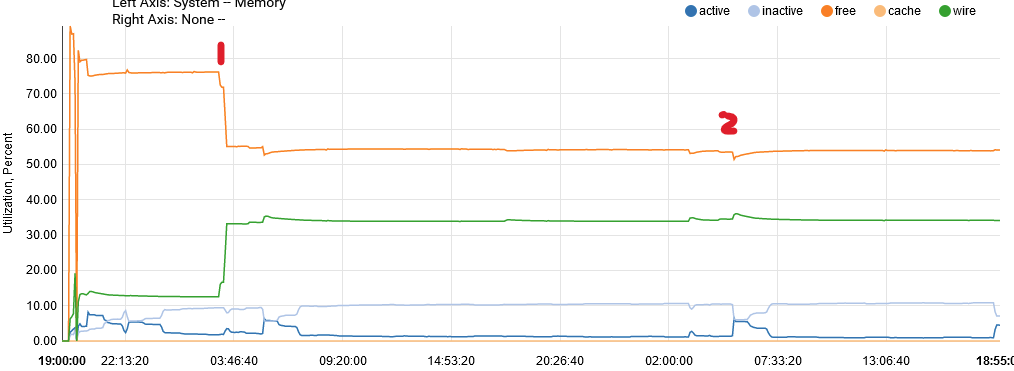
No pfSense system log entries between 01:01 and 04:30.
# /etc/crontab - root's crontab for FreeBSD # # $FreeBSD$ # SHELL=/bin/sh PATH=/sbin:/bin:/usr/sbin:/usr/bin:/usr/local/sbin:/usr/local/bin # #minute hour mday month wday who command # # Save some entropy so that /dev/random can re-seed on boot. */11 * * * * operator /usr/libexec/save-entropy # # Rotate log files every hour, if necessary. 0 * * * * root newsyslog # # Perform daily/weekly/monthly maintenance. 1 3 * * * root periodic daily 15 4 * * 6 root periodic weekly 30 5 1 * * root periodic monthly # # Adjust the time zone if the CMOS clock keeps local time, as opposed to # UTC time. See adjkerntz(8) for details. 1,31 0-5 * * * root adjkerntz -a # # pfSense specific crontab entries # Created: February 18, 2023, 8:19 pm # 1,31 0-5 * * * root /usr/bin/nice -n20 adjkerntz -a 1 3 1 * * root /usr/bin/nice -n20 /etc/rc.update_bogons.sh 1 1 * * * root /usr/bin/nice -n20 /etc/rc.dyndns.update */60 * * * * root /usr/bin/nice -n20 /usr/local/sbin/expiretable -v -t 3600 virusprot 30 12 * * * root /usr/bin/nice -n20 /etc/rc.update_urltables 1 0 * * * root /usr/bin/nice -n20 /etc/rc.update_pkg_metadata */1 * * * * root /usr/sbin/newsyslog 1 3 * * * root /etc/rc.periodic daily 15 4 * * 6 root /etc/rc.periodic weekly 30 5 1 * * root /etc/rc.periodic monthly 0 */4 * * * root /etc/rc.backup_rrd.sh 0 */4 * * * root /etc/rc.backup_dhcpleases.sh 0 */1 * * * root /etc/rc.backup_logs.sh 0 6 * * 5 root /usr/local/bin/php /usr/local/www/pfblockerng/pfblockerng.php dcc >> /var/log/pfblockerng/extras.log 2>&1 15 5 * * * root /usr/local/bin/php /usr/local/www/pfblockerng/pfblockerng.php cron >> /var/log/pfblockerng/pfblockerng.log 2>&1 # # If possible do not add items to this file manually. # If done so, this file must be terminated with a blank line (e.g. new line) #No particular memory hogs though?
Mem: 157M Active, 235M Inact, 1129M Wired, 1780M Free ARC: 781M Total, 638M MFU, 71M MRU, 280K Anon, 9429K Header, 61M Other 650M Compressed, 1401M Uncompressed, 2.16:1 Ratio PID USERNAME PRI NICE SIZE RES STATE C TIME WCPU COMMAND 16983 unbound 21 0 141M 120M kqread 1 0:11 2.04% /usr/local/sbin/unbound -c /var/unbound/unbound.conf 16983 unbound 20 0 141M 120M kqread 0 0:06 0.01% /usr/local/sbin/unbound -c /var/unbound/unbound.conf 26241 root 68 0 148M 52M accept 0 0:29 0.00% php-fpm: pool nginx (php-fpm){php-fpm} 495 root 68 0 148M 52M accept 0 0:23 0.00% php-fpm: pool nginx (php-fpm){php-fpm} 15289 root 68 0 148M 52M accept 0 0:37 0.00% php-fpm: pool nginx (php-fpm){php-fpm} 757 root 68 0 148M 51M accept 1 0:36 0.00% php-fpm: pool nginx (php-fpm){php-fpm} 494 root 29 0 149M 51M accept 0 0:37 0.00% php-fpm: pool nginx (php-fpm){php-fpm} 90123 root 68 0 144M 51M accept 1 0:22 0.00% php-fpm: pool nginx (php-fpm) 752 root 68 0 144M 51M accept 0 0:23 0.00% php-fpm: pool nginx (php-fpm) 493 root 20 0 111M 29M kqread 0 0:08 0.00% php-fpm: master process (/usr/local/lib/php-fpm.conf 47310 dhcpd 20 0 24M 13M select 1 0:00 0.01% /usr/local/sbin/dhcpd -user dhcpd -group _dhcp -chro 49371 dhcpd 20 0 22M 10M select 0 0:00 0.01% /usr/local/sbin/dhcpd -6 -user dhcpd -group _dhcp -c 60576 root 20 0 30M 10M kqread 1 0:06 0.00% nginx: worker process (nginx) 66552 root 20 0 20M 9840K select 1 0:00 0.02% sshd: admin@pts/0 (sshd) 60427 root 20 0 30M 9768K kqread 0 0:00 0.00% nginx: worker process (nginx) 59743 root 20 0 20M 8796K kqread 0 13:58 0.00% /usr/local/sbin/lighttpd_pfb -f /var/unbound/pfb_dns 18148 root 21 0 20M 8404K select 1 0:00 0.00% sshd: /usr/sbin/sshd [listener] 0 of 10-100 startups 60229 root 48 0 28M 7808K pause 0 0:00 0.00% nginx: master process /usr/local/sbin/nginx -c /var/ 59735 root 20 0 21M 7000K select 1 0:29 0.01% /usr/local/sbin/ntpd -g -c /var/etc/ntpd.conf -p /vaEdit: Would "/etc/rc.periodic daily" be doing something to trigger ZFS memory usage, that wouldn't release? (since the release notes say it won't after upgrading but that's normal and it will eventually release as needed)
-
S SteveITS referenced this topic on
-
@jimp said in 23.1 using more RAM:
top -aS -o res
I have suricata, pfBlockerNG and uptime over 5 days

So far did not notice any side effect…
-
@steveits Same on my 1100. RAM increases btw 3-4 am. Wired memory jumps from 28-31% to 55-70%.
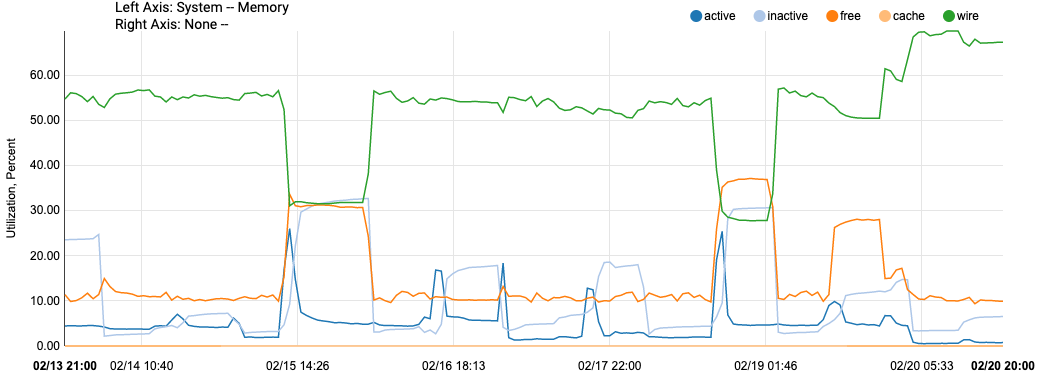
pfBlocker updates once a day at 2am and acme certificates runs at 3:16am every day. My cert is less than 60 days old so its not trying to renew and I don't see the PID still running. (doubt it would use that much RAM just checking the age of the cert)
Feb 20 03:16:00 ACME 55754 Renewal number of days not yet reached.
Feb 20 03:16:00 ACME 55754 Checking if renewal is needed for: ahking-Cert-Andrew
-
Just jumping in...
Update to 23.01 was done Thursday, 16th Feb. 2023, so its running only a short time.
Actually I do not see major issues, but curious about the memory threads I did a reboot yesterday and so it looks this morning: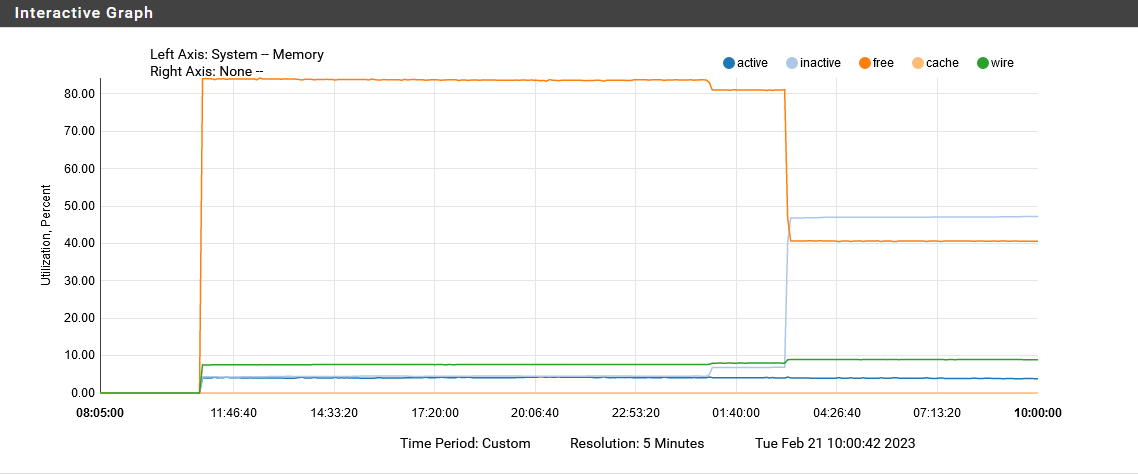
Investigating in cron the periodic_daily and pfBlockerNG running at 3.00am.
Appliance is a SG-3100 (no ZFS).
Will monitor this in the next days...Regards
-
Rebooted at 4PM yesterday. Memory doubled at exactly 3AM. The only cron job running at 3PM is the periodic daily job. There is nothing in the system logs that jumps out at me either. Note that my pfBlocker lists update at the top of every hour, so this is the the same in the logs:
Feb 21 02:54:00 sshguard 64916 Exiting on signal.
Feb 21 02:54:00 sshguard 42003 Now monitoring attacks.
Feb 21 03:00:00 php 29385 [pfBlockerNG] Starting cron process.
Feb 21 03:00:02 php 29385 [pfBlockerNG] No changes to Firewall rules, skipping Filter Reload
Feb 21 03:22:00 sshguard 42003 Exiting on signal.
Feb 21 03:22:00 sshguard 73966 Now monitoring attacks.
Feb 21 03:50:00 sshguard 73966 Exiting on signal.
Feb 21 03:50:00 sshguard 54191 Now monitoring attacks.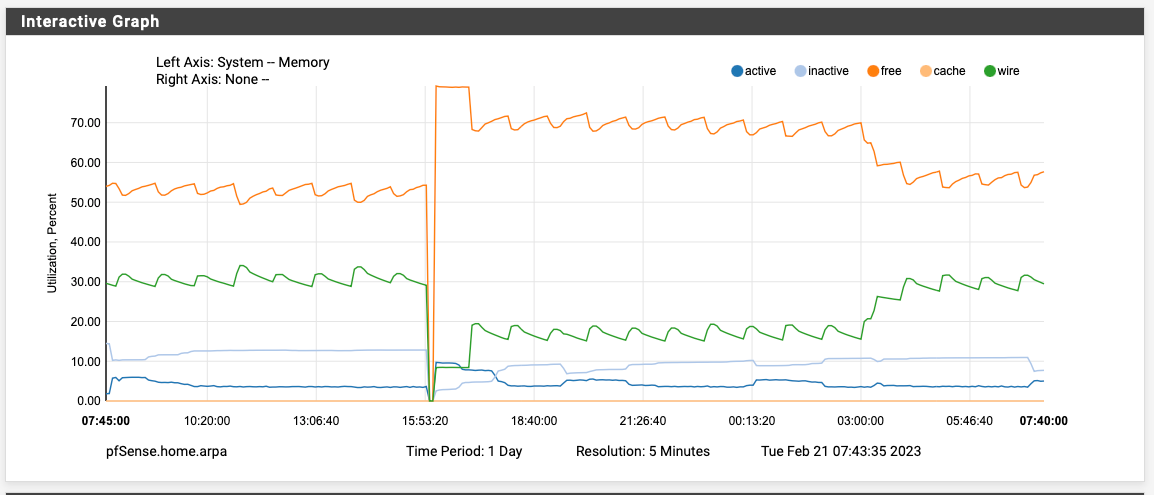
-
FYI, there's now package updates available for pfBlockerNG and Suricata. Perhaps this will help.
-
S SteveITS referenced this topic on
-
S SteveITS referenced this topic on
-
S SteveITS referenced this topic on
-
@defenderllc said in 23.1 using more RAM:
FYI, there's now package updates available for pfBlockerNG and Suricata. Perhaps this will help.
Installed both and rebooting... I will report back tomorrow morning so see if it resolved the 3AM spike.
-
At least this night no more memory usage:
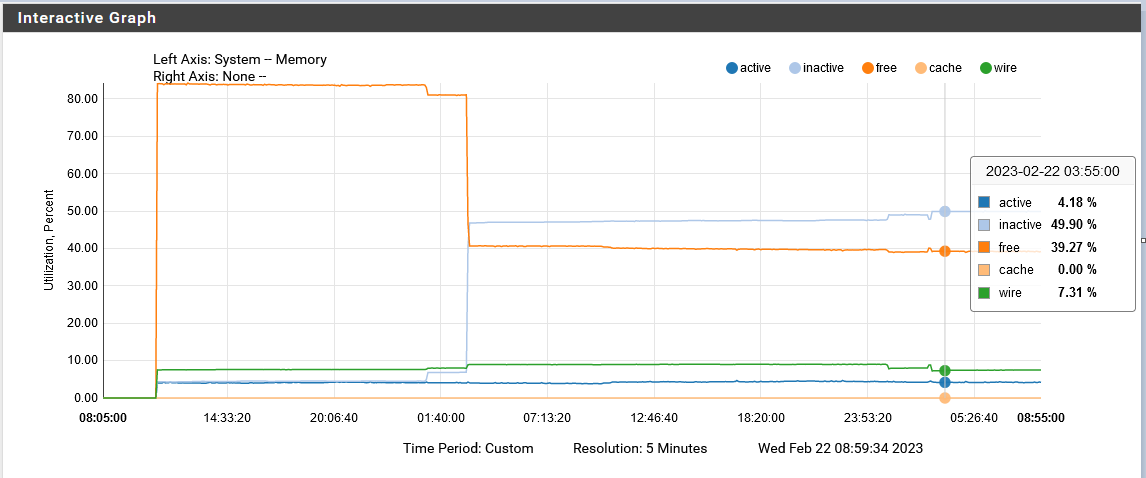
So it seems to be a one-time-shot, as others are reporting.
Regards
-
F FSC830 referenced this topic on
-
Upgraded to pfBlockerNG 3.2.0_2 yesterday, disabled Suricata completely, and rebooted around 9:30 AM yesterday morning. The memory utilization doubled again at exactly 3AM. The only cron job running at 3AM is the daily periodical and hourly pfBlocker updates (which there wasn't any lists to update today at 3AM).
I've also attached my system log from 2AM to 6AM and there is nothing worthwhile in there to explain what is happening at 3AM besides the daily periodical.
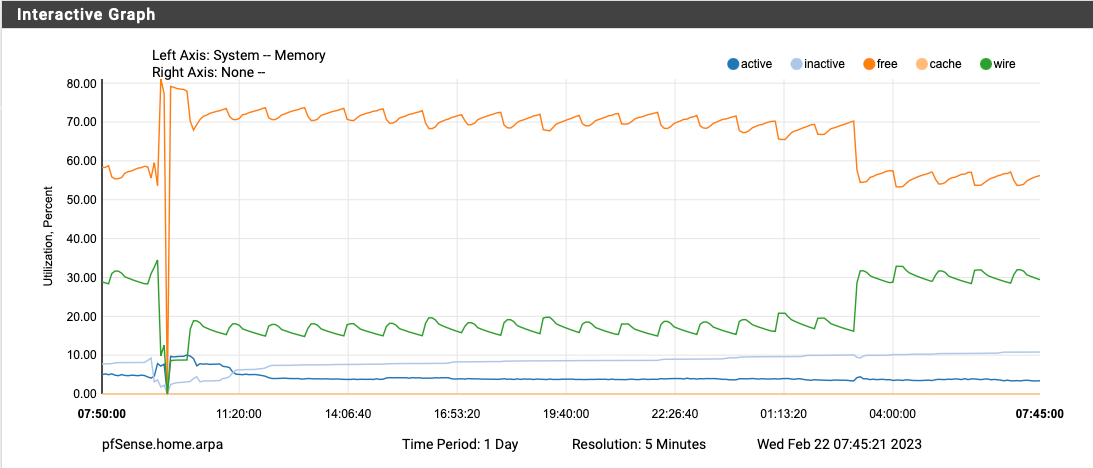
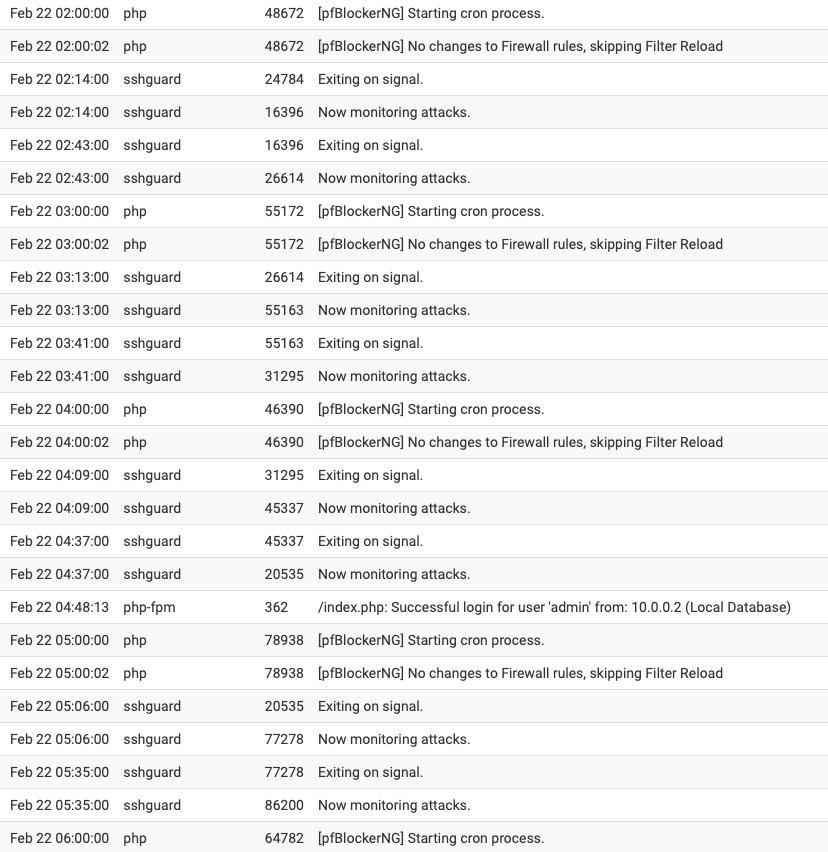
-
I'd have to look over the code but one thing it does during the daily periodic script is check if ZFS pools need to be scrubbed. I wouldn't expect that to trigger high memory usage in general, but it's possible. That wouldn't explain why some people see it and others don't, though.
Someone could reboot and then run periodic script by hand to see if doing so also triggers the increase in memory usage. Or even just try
zpool scrub pfSenseand check before/after that finishes. You can runzpool status pfSenseto check on the status of an active scrub operation. -
@jimp said in 23.1 using more RAM:
I'd have to look over the code but one thing it does during the daily periodic script is check if ZFS pools need to be scrubbed. I wouldn't expect that to trigger high memory usage in general, but it's possible. That wouldn't explain why some people see it and others don't, though.
Someone could reboot and then run periodic script by hand to see if doing so also triggers the increase in memory usage. Or even just try
zpool scrub pfSenseand check before/after that finishes. You can runzpool status pfSenseto check on the status of an active scrub operation.Hi Jim, I will try that when I get some free time today. This is a daily occurrence on my 6100 MAX. Here's 2-day graph from a few days ago. The memory never gets returned after the spike occurs.
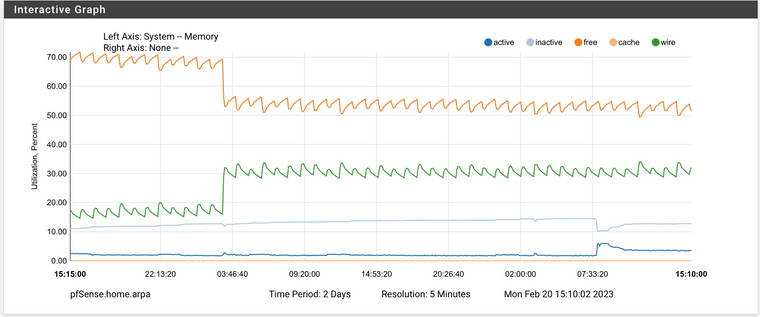
-
@jimp : Me too having that memory jump and do not use ZFS!??

Regards
-
If it's ZFS ARC usage that's what I'd expect to see. It won't give it up right away but if something else needs the RAM the kernel should reduce the cache as needed under memory pressure. That doesn't mean it would never swap, but it should mean it doesn't fill up swap.
You could also experiment with setting an upper bound on the ARC size (
vfs.zfs.arc_max=<bytes>as a tunable, doesn't need to be a loader tunable) for example, but the exact value for that depends a lot on your system (RAM size/Kernel memory, disk size, etc.). There are likely other ZFS parameters that could be tuned if that does turn out to be related.If you aren't using ZFS then we'll need to keep digging into what exactly is happening at that time that might also be contributing.
-
Its a SG-3100 and I never did setup this appliance with ZFS.
Regards
-
@jimp Running periodic was done in this thread https://forum.netgate.com/topic/178023/1100-upgrade-22-05-23-01-high-mem-usage/30 and triggered it.
-
@fsc830 said in 23.1 using more RAM:
Its a SG-3100 and I never did setup this appliance with ZFS.
The 3100 isn't capable of ZFS anyhow (it's 32-bit ARM). But just to be certain, do you see any messages referring to ZFS in the system log (Status > System Logs, General tab), boot log (Status > System Logs, OS Boot tab), or kernel message buffer (From a shell or Diagnostics > Command, run
dmesg)?Even if the system doesn't use ZFS for its filesystem something may be inadvertently triggering the modules to load.
-
 D DefenderLLC referenced this topic on
D DefenderLLC referenced this topic on
-
 D DefenderLLC referenced this topic on
D DefenderLLC referenced this topic on
-
 D DefenderLLC referenced this topic on
D DefenderLLC referenced this topic on
-
@jimp said in 23.1 using more RAM:
I'd have to look over the code but one thing it does during the daily periodic script is check if ZFS pools need to be scrubbed. I wouldn't expect that to trigger high memory usage in general, but it's possible. That wouldn't explain why some people see it and others don't, though.
Someone could reboot and then run periodic script by hand to see if doing so also triggers the increase in memory usage. Or even just try
zpool scrub pfSenseand check before/after that finishes. You can runzpool status pfSenseto check on the status of an active scrub operation.No change after launching those commands.
-
@jimp : Nothing seen about ZFS in any log.
I am aware that the SG-3100 is not using ZFS, anyhow, I did see some posts here in which people say, they had setup the appliance with ZFS!???But I didnt take care for more investigating in this as I dont not intend to use ZFS.
Regards